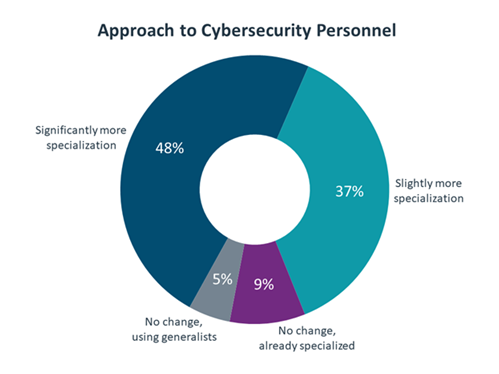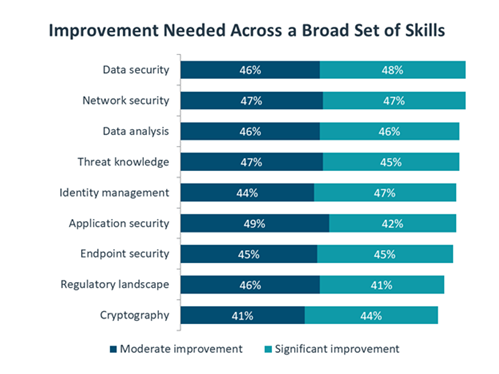
When beginning a career in technology, IT pros are used to choosing between different career pathways like networking, web development or IT security. But times have changed and there are now more specific specializations in each of these career pathways, and one pathway in particular – cybersecurity.
According to CompTIA’s 2020 State of Cybersecurity research report, cybersecurity teams are developing and becoming more specialized to fill different cybersecurity needs.
Organizational Cybersecurity Changes
Since cybersecurity is an aspect of technology that impacts businesses as a whole, members of upper management are now more involved with cybersecurity teams. Their participation ensures there is a unified cybersecurity plan in place among in the entire organization and opens lines of communication to executive level members of the company.
Organizations that once handled cybersecurity as a component of overall IT are now transitioning to dedicated cybersecurity teams. Cybersecurity is an extremely complex sector of technology and there is an ever-present need for cybersecurity tech pros with specialized skills versus general skills. In fact, 85% of organizations surveyed state that they have shifted to increased specialization within their cybersecurity teams.
To expand the skill sets of their IT pros, companies are exploring different options, and the efforts are starting from the inside out. Organizations are prioritizing their current IT pros, whether it is training them in specialized cybersecurity skills or supporting certification efforts. Some organizations are also hiring new employees with specialized cyber skills.
This is good news for IT pros that are looking for opportunities to advance in their current roles or for cybersecurity specialists that are looking for new jobs.

Cybersecurity Skills to Improve On
There is much more demand for targeted cybersecurity skills, as shown below. If you’re looking for somewhere to begin in terms of specializing in certain cybersecurity skills, this is a perfect place to begin.
Network Security: A smaller subset that falls under the larger umbrella of cybersecurity, it refers to the practice of preventing unauthorized users from accessing computer networks and their associated devices. You can learn more about network security with CompTIA Security+.
Threat Knowledge: With the growing list of cyber threats that exists today, IT pros need to be knowledgeable in foundational attacks as well as emerging attacks. CompTIA Cybersecurity Analyst (CySA+) covers what you need to know about cyber threats.
Application Security: The assessments of applications and other software to determine how to make information more secure. Getting CompTIA PenTest+ proves you have the skills to manage application security.
Data Security: Protecting data from unauthorized users is a vital skill for IT pros in the cybersecurity field. Learn about data security and other complex cybersecurity job roles when you study for and earn CompTIA Advanced Security Practitioner (CASP+).

Read more about the cybersecurity skills IT pros need to build their knowledge base and careers.
4 Reasons Why You Should Consider a Cybersecurity Specialization
1. You Could Earn a Higher Salary
Specializations - to put it simply - are special, meaning they are less common and therefore, more valuable. IT pros with cybersecurity specializations are more apt to earn a higher salary because they bring more specific skills to the table.
For example, a general cybersecurity job role like cybersecurity analyst earns a median annual wage of $99,730* while a more specialized cybersecurity job role like penetration tester earns an average salary of $104,000 a year^.
2. It May Be More Efficient to Specialize
Focusing on one thing is more productive than focusing on several things, right? Specializing in a certain sector of cybersecurity may end up being more logical for your career in the long run because your area of concentration is more focused.
3. Job Security is Higher
Having a specialized skill set creates more value because there are not a lot of people that can do your job the way you can. Being an irreplaceable asset at your company provides job security which also can make for less job-related stress.
4. Personal Satisfaction
Specializing and becoming an expert in a certain cybersecurity skill can also bring higher levels of personal satisfaction to IT pros. The internal sense of fulfillment you feel is priceless and can give you a better quality of life.
How to Begin the Path to Cybersecurity Specialization
If you are still early on in your IT career, don’t stress too much about choosing a cybersecurity specialization. While there are many benefits to specialization as mentioned above, it’s important that novice IT pros learn as much as possible in as many sectors of IT as they can. You need a solid foundation of data, networking and device management skills even if your end goal is to specialize in cybersecurity. You can’t protect those systems without knowing how they work first!
IT pros who are ready to specialize should consider earning a cybersecurity certification like CompTIA CySA+ or CompTIA PenTest+ to validate their cybersecurity skills. Because of the differing topics in each of these certifications, they can act as a guide to determine the area of cybersecurity you enjoy most to concentrate on your specialization.
Elevate your IT career with more informative articles like this and on the CompTIA Resource Center. Take the first step today!
*Source: (U.S. Bureau of Labor Statistics)
^Source: Cyberseek.org

